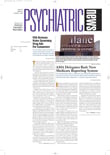In the psychiatric domain, infectious agents may produce some surprises. For instance, evidence has been building since the late 1980s that the streptococcus bacterium might cause, or at least contribute to, certain cases of obsessive-compulsive disorder (OCD). And now a new study out of London bolsters that argument.
Isobel Heyman, M.D., Ph.D., a consulting child and adolescent psychiatrist at the Institute of Psychiatry in London, and coworkers drew blood from 50 children and adolescents with DSM-IV-defined OCD, 100 children and adolescents with other conditions (stroke, metabolic movement disorders, or encephalitis), and 40 healthy children and adolescents.
They then determined whether antibodies in the blood samples reacted with a specific antigen—delipidated human basal ganglia (caudate and putamen)—since the basal ganglia has been heavily implicated in OCD.
They found anti-basal ganglia antibodies in 42 percent of subjects with OCD, but only in 2 percent to 10 percent of the control groups—a highly significant difference.
These results, Heyman and her group concluded in the October British Journal of Psychiatry, thus suggest that “central nervous system autoimmunity may have a role in a significant subgroup of cases of OCD.” They also imply that the autoimmunity is provoked by the strep bacterium since patients with a neurological disorder robustly established as a post-strep autoimmune disorder—Sydenham's chorea—usually test positive for antibodies that attack basal ganglia.
The findings are too preliminary to have immediate practical implications for clinicians, Heyman told Psychiatric News. “Children and adolescents with OCD should receive the current evidence-based treatments, which are cognitive-behavior therapy with or without SSRI medication.”
However, she added, “It will be important to research whether children with OCD who have evidence of previous strep infection respond any differently to these standard treatments. Our current clinical view is that they respond in the same way, with up to 80 percent of children showing a good response to treatment.”
Also, “if it is proven that recurrent strep infections are associated with OCD in vulnerable individuals, and strep is isolated in these children, it might be reasonable,” she said, “to study further whether maintenance on antibiotics reduces infectious episodes and in turn is associated with an improvement in OCD. But we are a long way from this being standard clinical practice, as it needs further trials.”
The study was funded by Action Research UK, the Barnwood House Trust, and the University College London.
Br J Psychiatry 2005 187 314
